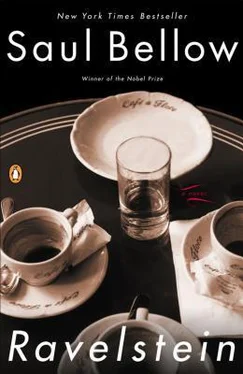The place where I sat reading, where Rosamund and I waited for the ambulance to bring Ravelstein home, was a small courtyard inside the wrought-iron gates. A stone pool, shrubs, grass-there were even shade-flowers. Frogs and toads would have done well here, but you'd have had to import them. Where would they have come from? There were no frogs in the miles of rubble that sur rounded this sanctuary. The courtyard was something like a de compressing chamber. For some of the professor-tenants it may have recalled the grotto-retreats built by English gentlemen in the eighteenth century. You wanted some protection from the brute facts. To be fully aware of both the sanctuary and the slum, you had to be a Ravelstein. "Out there," he would say, laughing, "the cops will tell you not to stop at a red light. In no-man's-land, it could be the end of you to stop." You must not be swallowed up by the history of your own time, Ravelstein often would say. He quoted Schiller to the same effect: "Live with your century but do not be its creature."
The architect who put a little Alhambra arcade here, with water pipes and shade plants had much the same idea: "Live in this city but don't belong to it."
Rosamund, who was sitting beside me on the edge of the stone basin, did not feel shut out when I was reading.
It had taken Ravelstein some time to get used to seeing Rosamund and me as a married pair. There was a kind of oddity about that because he took an unusual interest in his students, and Rosamund was one of them. He would have said, if asked about this, that given the sort of education they were getting, with its un usual emphasis "on the affects"-on love, not to beat around the bush-it would have been irresponsible to pretend that the teach ing could be separated from the binding of souls. That was his old-fashioned way of putting it. Naturally there was a Greek word for it, and I can't be expected to remember every Greek word I heard from him. Eros was a _daimon__, one's genius or demon provided by Zeus as a compensation for the cruel breaking up of the original androgynous human whole. I'm sure I've got that part of the Aristophanic sex-myth straight. With the help of Eros we go on, each of us, looking for his missing half. Ravelstein was in real earnest about this quest, driven by longing. Not everyone feels that longing, or acknowledges it if he does feel it. In literature Antony and Cleopatra had it, Romeo and Juliet had it. Closer to our own time Anna Karenina and Emma Bovary had it, Stendhal's Madame de Renal in her simplicity and innocence had it. And of course others, untaught, untouched by open recognition have it in some obscure form. This was what Ravelstein was continually on the watch for, and with such a preoccupation he was only a step from arranging matches. Doing the best that could be done with these powerful but incomplete needs. A good palliative for the not-always-conscious pain of longing had a significant importance of its own. We have to keep life going, one way or another. Marriages must be made. In adultery men and women hope for a brief reprieve from the lifelong pain of privation. What made adultery a venial sin in Ravelstein's judgment was that the pain of our longings drives us so mercilessly. "Souls Without Longing" had been the working title of his famous book. But for most of mankind the longings have, one way or another, been eliminated.
— How have I gotten so far afield?
I am bound as an honest observer to make plain how Ravelstein operated. If he cared about you it was in this perspective that he would sketch you. You wouldn't have believed how much thought he devoted to each and every case, the closeness with which he ob served the students he had accepted for higher or esoteric training, those willing to break with the orthodox social science majority which dominated the profession. If students followed Ravelstein, they would find jobs hard to get. So you had to think how to provide for the young people who were chosen. Professionally speaking, they had made an erratic choice. Ravelstein often asked my opinion. "What if Smith were to pair up with Sarah? He's got some queer tendencies but he'll never be a queer. Now Sarah is a very serious young woman-disciplined, hard-working, loves her books. No genius but she's got a lot going for her. She may have just the touch of masculinity that would make young Smith happy."
He was so accustomed to thinking up arrangements of this sort that he apparently had had something in mind for me after Vela divorced me. My mistakes were so clear that I couldn't be trusted to do anything right. He had accurately prophesied seven or eight years ago, "Vela will soon be through with you. She's off to conferences all over the world. She's never home for as much as a week. Whereas you've got the uxorious tendency, Chick. And all you've got to live with now are her clothes hanging in the closet. It's only to be respectable that she needs a husband. I don't think men are her top preference. But she's an odd case; she's got the makings of a beauty but she's not a beauty, no matter how she dresses and makes up. Now you as an artist, Chick, spotted her as having something to do with beauty. It's a fact that she has beautiful eyes but, closely looked at, she's got some sort of European military correctness about her. And when she inspects you, you just don't make the grade with her. Mentally speaking, she comes toward you but then walks away as fast as her high heels will carry her. She's an odd one, Chick. But you're pretty odd yourself. Artists fall in love, of course, but love isn't their primary gift. They love their high function, the use of their genius, not actual women. They have their own sort of driving force. Now Goethe of course had his _daimon__, he talked about it to Eckermann all the time. And in old age he fell in love with a very beautiful young thing. But of course this falling in love was _dйrisoire__-a pure absurdity…"
This was his way of laying open a subject-not entirely flattering, but then he never flattered anyone, nor did he level with you in order to put you down. He simply believed that a willingness to let the selfesteem-structure be attacked and burned to the ground was a measure of your seriousness. A man should be able to hear, and to bear, the worst that could be said of him.
But some time before, in her wonderfully polished but also clumsy not-of-this-world way, Vela had already begun divorce proceedings. It appeared that she had retained a lawyer as much as a year earlier. This lawyer, a woman who belonged to a tremendous downtown law firm, knew to a nickel what my assets were, and Vela's demand was for twenty-five percent of my bank account, tax-exempt. She went downtown regularly to have her hair and her eyebrows done and to shop for dresses and shoes. Often she lunched with a friend-or with her lawyer.
We had no domestic routines at all. What we had was a loose arrangement-a household, not the locus of married love or even affection. When supplies ran low, Vela went to the supermarket and bought up a storm-apples, grapefruits, meats for the freezer, cakes, tapioca puddings for dessert, canned tuna and tomato her rings, onions, rice, dry breakfast cereals, bananas, salad greens, cantaloupes. I tried several times to teach her how to choose a melon by sniffing it at the bottom, but evidently she didn't want to be seen doing anything out of line for a person of beauty and delicacy. She bought bread and rolls, soap powder for the dishwasher, steel wool for the pots. Several hundred dollars' worth of groceries were then delivered in cardboard boxes. After shopping, she didn't return to the apartment but drove on to the university. I took delivery at home and stacked the fridge and the kitchen shelves. I stomped the cartons flat and took them down in the elevator. I was on friendly terms with the super and didn't want to bother him with the trash.
Читать дальше












